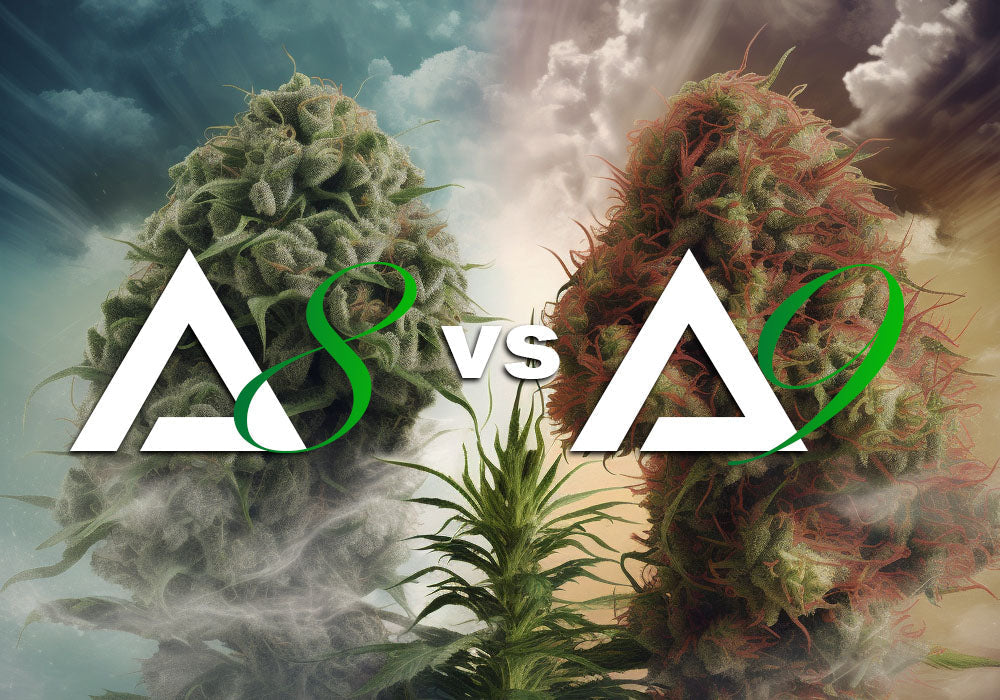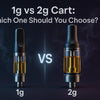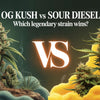Understanding the Differences Between Delta 8 and Delta 9

Curious about Delta 8 and Delta 9 in the world of cannabis? These compounds have gained significant attention due to their distinct effects and complex legal positions. Let's explore the core differences between these chemical relatives to help you determine whether Delta 8 vaping suits your preferences or if Delta 9's characteristics align better with your interests.
Breaking Down Delta 8 and Delta 9
Both Delta 8 and Delta 9 fall under the THC category. Delta 9 is the main psychoactive article found in marijuana. While they share chemical similarities, their effects on users can differ a lot.
Whenever we talk about THC, we are generally talking about Delta 9. It's the dominant compound in cannabis plants and is recognized for creating intense psychoactive effects. Many users experience these effects through products like a sativa THC cartridge, which delivers uplifting and energizing sensations commonly associated with sativa strains.
It can produce both calming and stimulating sensations while intensifying sensory perceptions considerably. However, users should note its molecular structure has slight changes, leading to gentler effects. People often see Delta 8 as Delta 9's chiller, less intense relative—it brings similar positives but without the strong punch that Delta 9 might pack, making it a popular choice for those who prefer a balanced hybrid weed cart experience.
How Do They Influence the Body?
Delta 8 THC is building a name for its ability to offer a crisper higher than Delta 9. Delta 8 users are sharing stories of feeling chill and happy but without the worry and paranoia high doses of Delta 9 might throw at them. Because of this, stuff like Delta 8 gummies and edibles are getting thumbs up from folks aiming to tap into THC's goodies but not wanting to be swamped by it.
When it comes to packing a punch with psychoactive vibes, Delta 9 THC takes the lead. That old-school THC hit can twist your senses, shift your emotions, and mess with your head. Sure, it might bring on some heavy chill and bliss, but not everyone’s down for the intense sideshows—especially when enjoyed through potent options like live resin gummies.
Legal Status
Navigating the laws around Delta 8 and Delta 9 THC is no walk in the park, seeing as it changes depending on where you are. A bunch of spots still have Delta 9 THC under the same rules as your regular weed, which sorta means you can grab it — along with products like live thc resin gummies — where they give the thumbs up to medical or fun-time weed.
Delta 8 THC kinda sits in a weird spot since it's made from hemp, which is cool and legal all over the US if it's got less than 0.3% Delta 9 THC, thanks to the Farm Bill. So this means you can sometimes grab Delta 8 Carts and gummies, even in places where the usual cannabis is a no-go. But you gotta keep your eyes peeled 'cause the rules are always shifting, and some spots have gone ahead and banned Delta 8.
All the Different Stuff It Comes In
You can find both these cannabis types in lots of different styles. Delta 9 throws a party with smokable flowers, concentrated extracts, and edibles. It's been on the block for a while, so there's a lot more to choose from, and people have gotten really creative making DIY flavors.
Delta 8 products are gaining traction, highlighted by the rise of items such as Delta 8 vape pens, Delta 8 disposable, and Delta 8 edibles. Folks who want milder effects and not to stress over legal issues are finding these products super appealing.
Picking the Best Fit
Pick Delta 8 if stress or anxiety's bugging you, but you're not up for super strong vibes. It's a solid pick, too, if you're chilling in a spot where the weed laws are tough, but hemp stuff's still up for grabs. Popular strains like the og kush vape also provide a balanced option for relaxation.
Choose Delta 9 if you want the full strength of THC and can handle its mind-altering effects. It's a good pick if your state allows weed; you'll find lots of different products and varieties.
Unpacking How They're Made and Found
Grasping the creation of Delta 8 and Delta 9 gives insight into their market presence. Plants packed with cannabis churn out plenty of Delta 9 THC in the ripe flower buds. Pulling it out and polishing it up is pretty easy, leading to the bunch of choices in Delta 9 goodies.
Cannabis plants contain Delta 8 THC in pretty tiny quantities. It is made from CBD, which comes out of hemp, by switching things up with chemicals. This way of whipping up Delta 8 is a touch more tricky, and it kinda plays a part in how easy it is to get your hands on the stuff, not to mention how much cash you gotta fork over. But hey, thanks to some nifty tweakin' in how we cook up Delta 8, there's been a legit boom, and it's popping up all over the shop. Now, more vapers can try it out through options like a 1 gram cart, even if they can't grab the usual cannabis goodies.
Terpenes and Their Gig in Delta 8 and Delta 9 Goodies
When you chat about Delta 8 and Delta 9, just remember that terpenes matter. These bits are found in lots of plants, especially cannabis, they make things taste and feel different. You can mix terpenes into Delta 8 and Delta 9 stuff to make the experience even better for folks using them.
Some users even prefer strain-inspired options, like a granddaddy purple vape, which highlights how terpenes shape flavor and overall vibe.
Now, in the world of Delta 9 goodies, terpenes help decide what the strain's gonna be like, right? They shape more than just how it smells or tastes; they influence the kind of impact it has — like if it's gonna perk you up or mellow you out. This type of customization lets people pick products that match what they're looking for.
Delta 8 goods get a boost when you throw in terpenes. These guys kinda recreate the teamwork vibe you get with weed. So by chuckin' in certain terpenes, the folks makin' Delta 8 can get the product's effects to hit just right. This way, folks who dig a more chill vibe without getting super blitzed, like with Delta 9, are gonna be all about it.
Wrapping It Up
If you favor the calming taste of a Delta 8 treat or prefer the powerful kick from a Delta 9 item, getting to know these substances allows you to choose to match what you want and how you live. Keep in mind the universe of cannabis is huge and diverse, with options that can fit all kinds of people. So, chill, dig into the facts, and grab the stuff perfect for you.
FAQs
Q1: What's the difference between D8 and D9 THC's effects?
A1: Delta 8 THC tends to give you lighter effects and doesn't fog your brain as much. It's less about the high and doesn't mess much with your head. On the flip side, Delta 9 THC hits harder with its mind-bending powers. It pumps up your senses and the feel-good vibes way more.
Q2: When it comes to strength, which one wins, Delta 8 or Delta 9 THC?
A2: Delta 9 THC takes the crown for being the heavy hitter. It's got more muscle in changing your mood, tweaking how you see things, and messing with your thoughts.
Q3: Compared to Delta 9 THC, does Delta 8 THC have any good stuff to offer?
A3: Many prefer Delta 8 THC because it can calm nerves and cause less anxiety, making for both a smoother and steadier vibe. Likewise, it's famous for easing pain, stopping nausea, and making you hungry. It does stuff like Delta 9, but your mind stays clearer.
Q4: Picking Delta 8 or Delta 9 goodies, huh?
A4: What you want matters when deciding: go with Delta 8 if you're into chiller effects that are easier to handle and not so tied up in legal red tape. Swing for Delta 9 when you need powerful relief and don't mind the intense head trip – but if it's cool by law where you live.
Q5: Delta 8 versus Delta 9 THC: How long's the ride?
A5: Delta 8's effects can stick around for a stretch of 3 to 5 hours, much like Delta 9, yet folks tend to experience a smoother glide back to normal sans the harsh crash associated with Delta 8.
Q6: Delta 8 THC versus Delta 9 THC: What's the deal with getting your hands on it?
A6: Thanks to its standing in the eyes of the law, you'll find Delta 8 THC popping up in more spots, unlike its cousin Delta 9 THC, which’s still under tight wraps in loads of places. And here’s a fun tidbit – Delta 8 gets the green light because you can snatch it from hemp.





